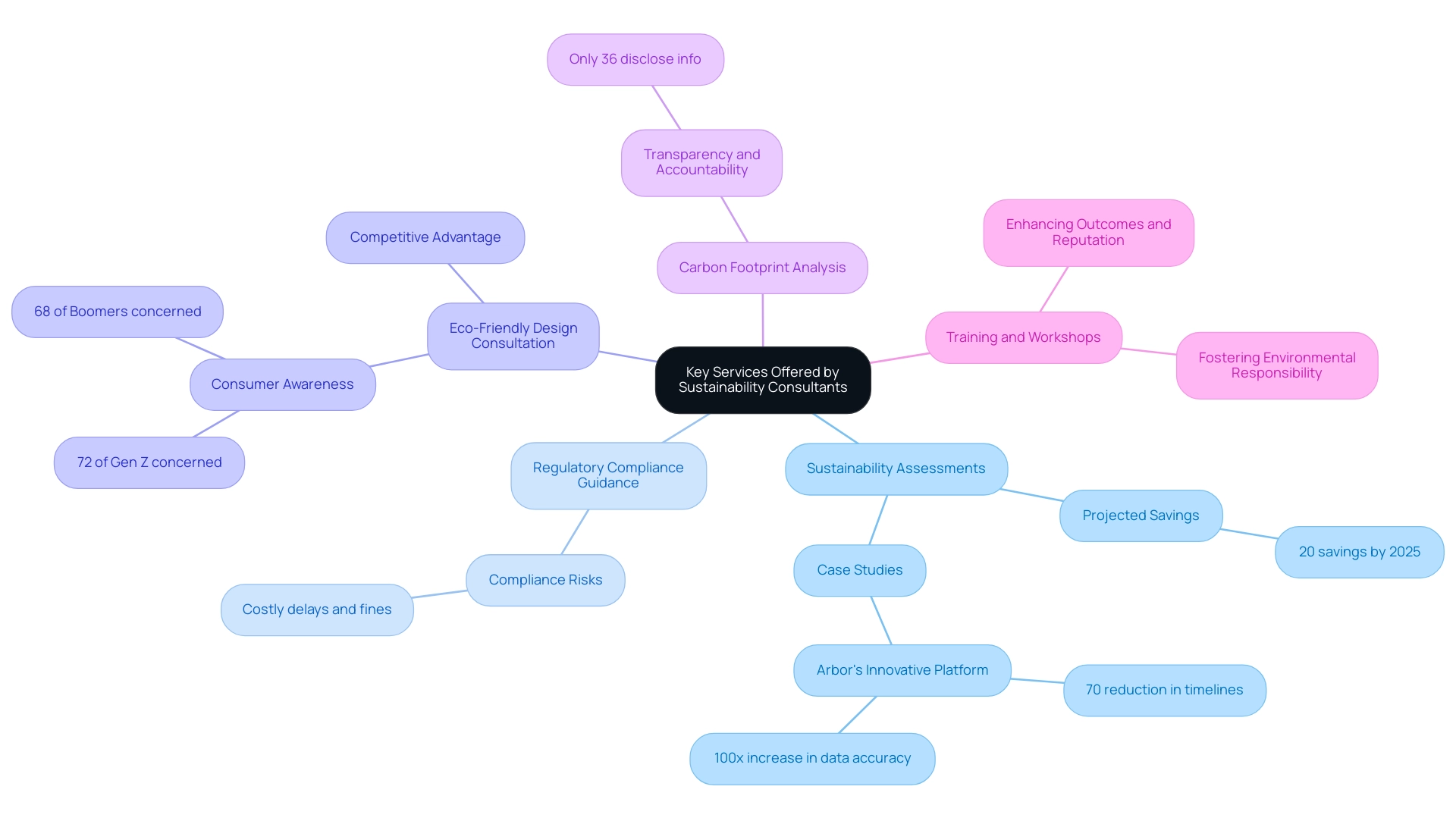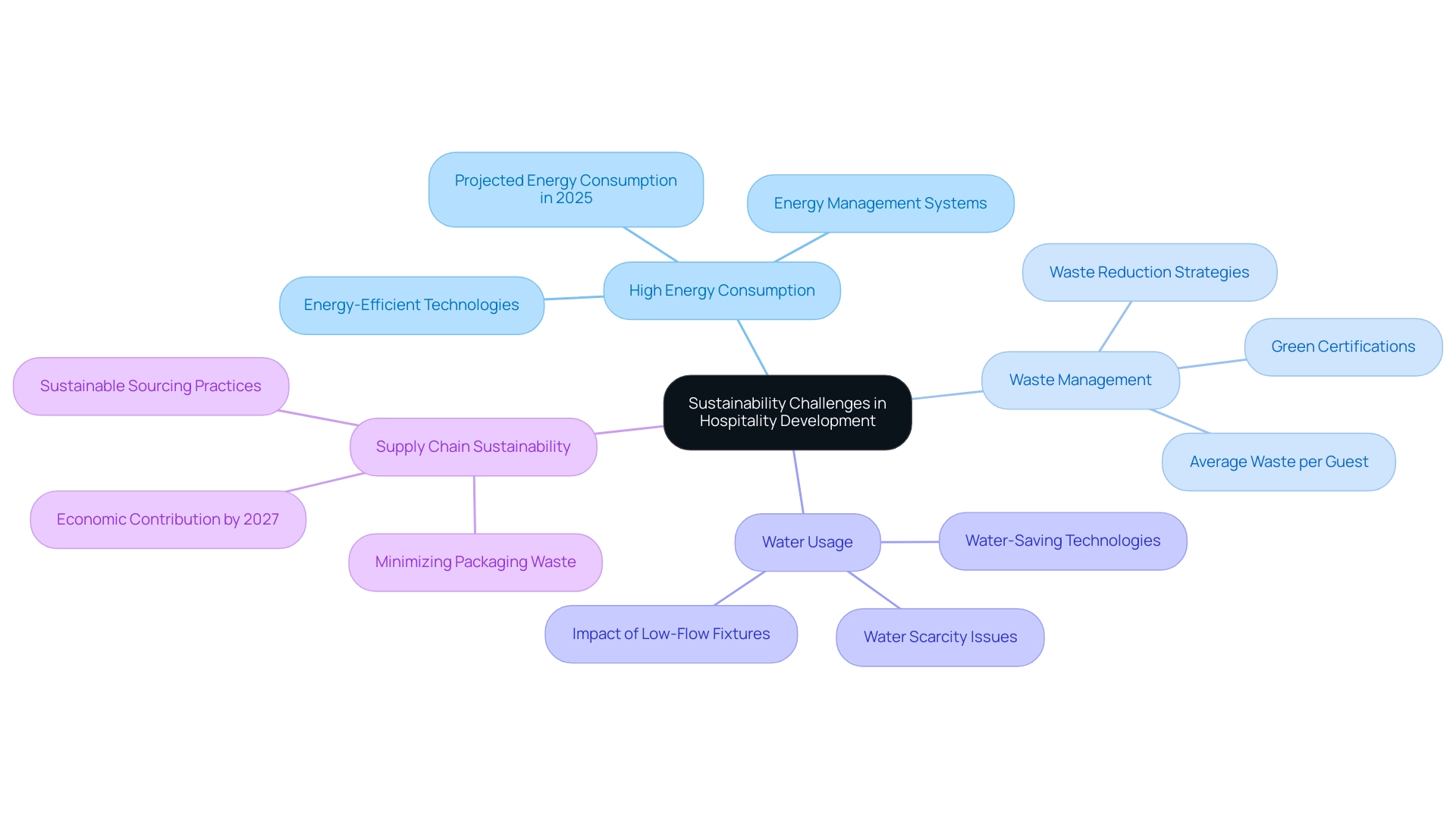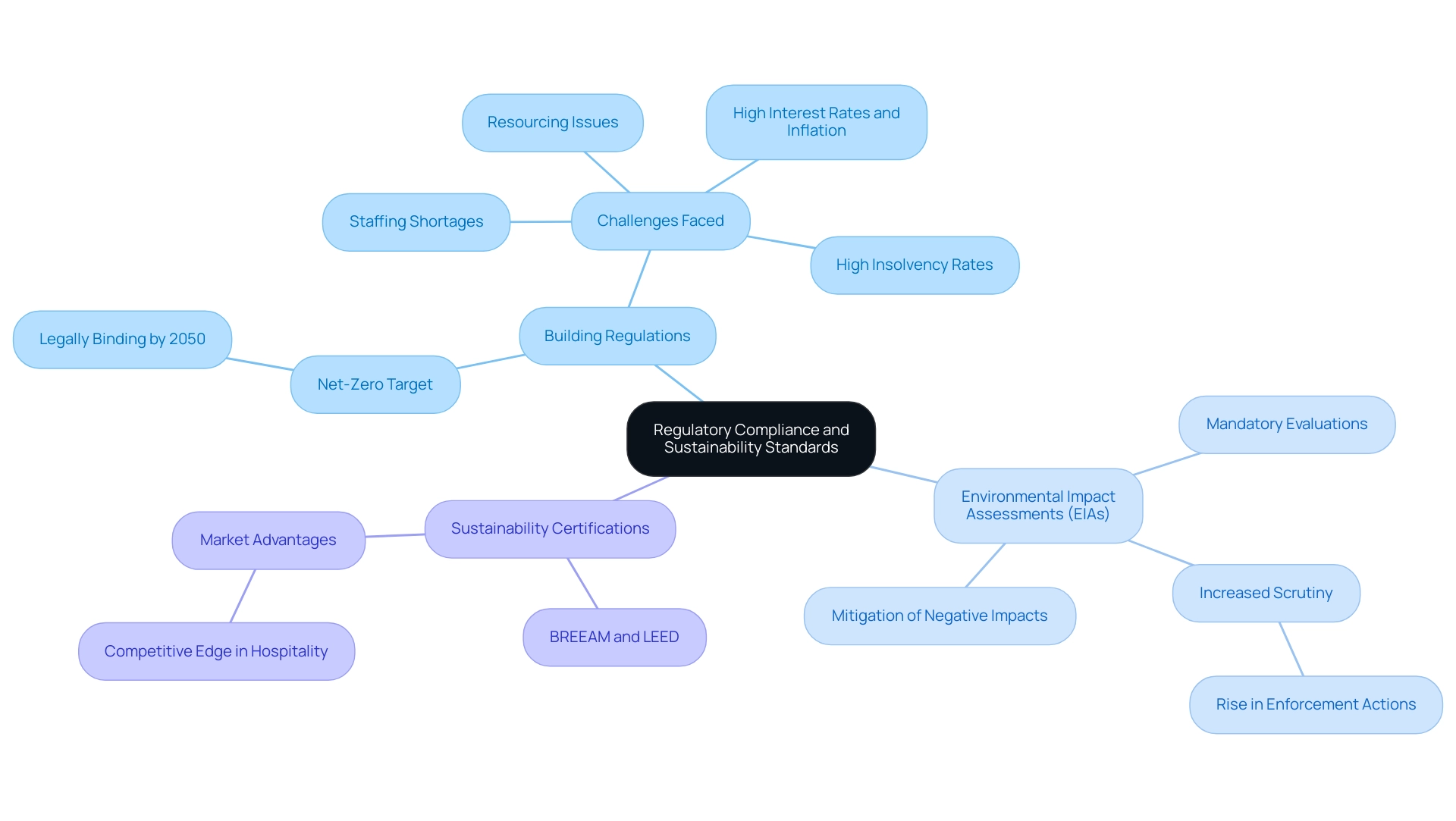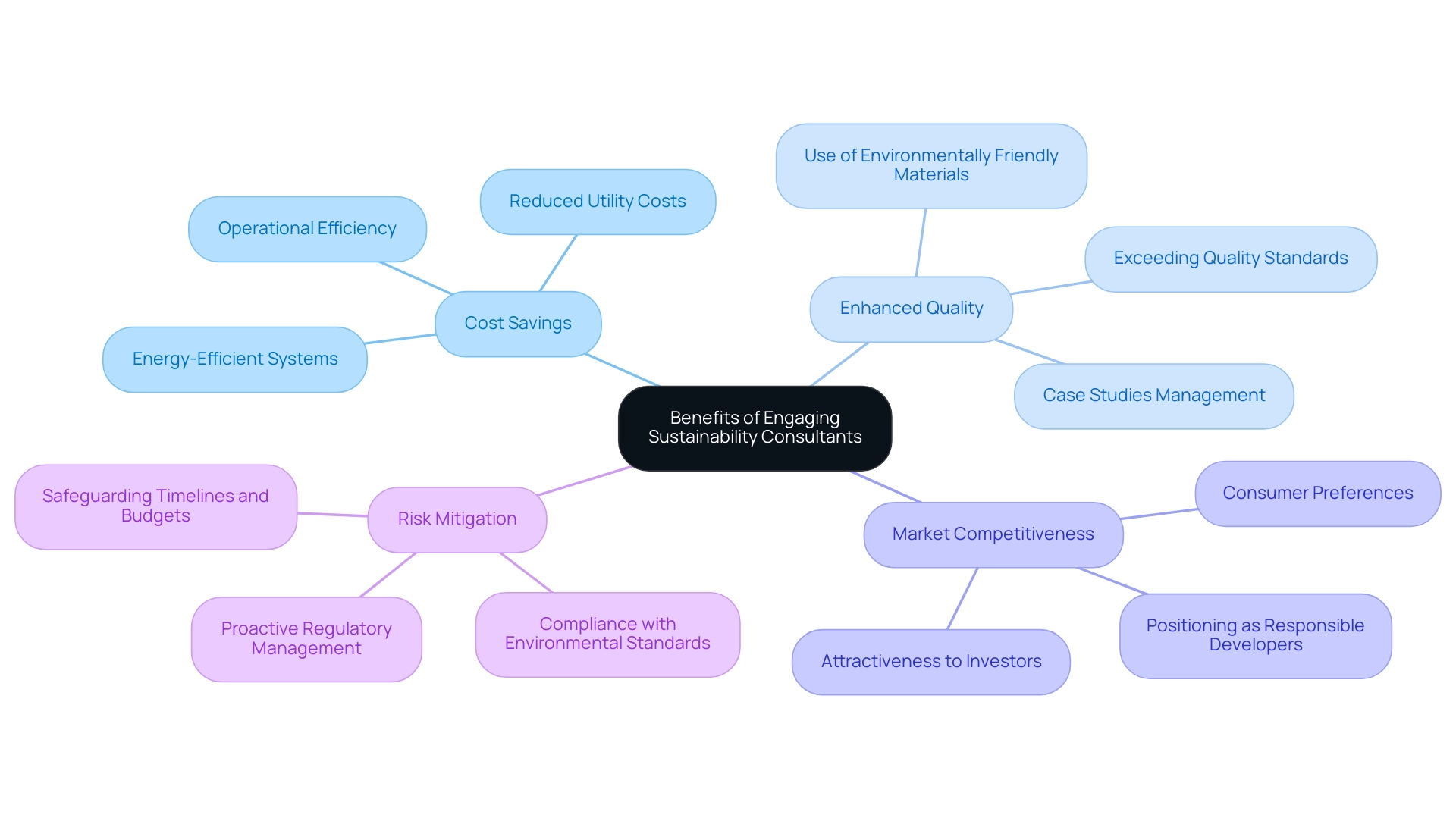27 Mar 2025
BlogOverview
Sustainability consultancy is essential for developers seeking to navigate intricate environmental regulations, enhance project viability, and satisfy the increasing market demand for eco-friendly practices.
Engaging sustainability consultants not only helps developers achieve significant cost savings but also improves project quality and mitigates compliance risks.
This strategic partnership ultimately positions them as leaders in sustainable construction, adeptly responding to the evolving standards of the industry.
By embracing sustainability, developers can secure a competitive edge and demonstrate their commitment to responsible development.
Introduction
In an age where environmental consciousness is not merely optional but essential, sustainability consultancy stands as a critical ally for organisations navigating the complexities of eco-friendly operations. This burgeoning field not only assists developers in minimising their ecological footprint but also enhances resource efficiency and ensures compliance with stringent regulations.
As London’s construction landscape faces increasing scrutiny regarding its environmental impact, the role of sustainability consultants becomes paramount. With the environmental and sustainability consulting market experiencing remarkable growth, developers who embrace these services can elevate their projects, ensuring they meet both regulatory demands and market expectations.
By integrating sustainable practices from the outset, they not only contribute to a greener future but also position themselves as leaders in a competitive and evolving industry.
Understanding Sustainability Consultancy
Sustainability consultancy plays a pivotal role in guiding organisations toward environmentally responsible operations. This field encompasses a range of services designed to reduce environmental impact, improve resource efficiency, and ensure compliance with environmental regulations. In London, where construction activities face heightened scrutiny regarding their ecological footprint, sustainability consultancy has become indispensable for developers striving to meet regulatory standards and market demands.
As we approach 2025, the significance of eco-friendly consultancy is underscored by the rapid expansion of the environmental and eco consulting market, which has experienced double-digit growth for two consecutive years. This surge is largely driven by investments in energy transition, infrastructure resiliency, and the imperative of achieving net zero emissions. Developers engaging in environmental consultancy not only ensure adherence but also enhance the quality and appeal of their projects by incorporating eco-friendly practices from the outset.
Successful sustainability consultants projects exemplify this trend. For instance, Edmond Shipway’s Mechanical and Electrical (M&E) consultancy specialises in building services that focus on energy efficiency and CO2 reduction, addressing critical environmental concerns within the construction sector. Additionally, Edmond Shipway’s cost consultancy services play a crucial role in lowering energy expenses for clients, further enhancing the value of eco-friendly solutions.
This commitment not only meets client demands for sustainable practices but also bolsters the firm’s reputation as an innovative leader in the consultancy market. By integrating eco-friendliness into project planning, Edmond Shipway enhances overall project viability and aligns with market expectations, showcasing how effective consultancy can drive energy efficiency and environmental responsibility towards a Net Zero Carbon future.
Current trends indicate that developers are increasingly recognising the importance of environmental consultancy as a strategic asset. As the worldwide demand for eco-friendly approaches escalates, particularly in light of forecasts suggesting that AI usage might necessitate considerable water resources by 2027, the urgency for effective environmental strategies has never been greater. This underscores the necessity for developers to embrace eco-friendly methodologies to mitigate potential resource challenges in the future.
Expert opinions, highlight that while some companies may hesitate in their net zero commitments, there is a growing acknowledgment of the need for collaboration across supply chains to effectively address climate and nature risks. Despite signs of some companies pulling back from commitments on net zero, where we are seeing action is in response to climate and nature risks across supply chains.
In summary, sustainability consultancy is not merely a regulatory requirement; it is a vital element of modern construction methods that enhances project viability and aligns with the evolving expectations of stakeholders in London’s dynamic market.
Key Services Offered by Sustainability Consultants
Edmond Shipway’s sustainability consultancy provides a comprehensive suite of services designed to assist developers in navigating the complexities of sustainable construction, building on our legacy in cost consultancy. Key offerings include:
- Sustainability Assessments: These evaluations are essential for identifying current practices and pinpointing areas for improvement. They enhance the efficiency of initiatives and can lead to substantial cost reductions, with average savings from environmental assessments projected to reach 20% by 2025.
- Regulatory Compliance Guidance: Our consultants ensure that initiatives comply with local and national sustainability regulations, a growing necessity as compliance standards evolve. This guidance mitigates risks associated with non-compliance, which can result in costly delays and fines.
- Eco-Friendly Design Consultation: This service focuses on advising developers regarding the selection of environmentally friendly materials and energy-efficient designs, aligning with the increasing demand for green construction methods. As consumer awareness rises, emphasising eco-friendly design becomes a competitive advantage.
- Carbon Footprint Analysis: Our consultants assess and strategise to lower carbon emissions throughout the initiative lifecycle, with a strong emphasis on energy efficiency. This analysis is critical as companies face rising pressure to disclose environmental information; currently, only 36% of companies do so, highlighting a significant opportunity for improvement in transparency and accountability in eco-friendly practices.
- Training and Workshops: These educational sessions equip teams with the knowledge necessary to implement sustainable practices and comply with evolving regulations. By fostering a culture of environmental responsibility within organisations, developers can enhance their outcomes and reputation.
The importance of environmental assessments in construction cannot be overstated. They serve as a foundational step in developing effective ecological strategies, ensuring projects not only meet regulatory requirements but also align with broader environmental goals. As the sustainability consultancy market in London evolves, indicating a shift towards digital technologies and an increased focus on ecological concerns, developers must remain informed to stay competitive.
By leveraging these insights and services from Edmond Shipway, developers can position themselves as leaders in sustainable construction while contributing to our collective goal of reducing CO2 emissions and achieving a Net Zero Carbon future.

Navigating Sustainability Challenges in Hospitality Development
Hospitality development faces a multitude of environmental challenges that demand innovative solutions and strategic planning. Key issues include:
- High Energy Consumption: The hospitality sector, particularly hotels and restaurants, is marked by substantial energy demands. In London, energy consumption in this sector is projected to remain elevated in 2025, necessitating a robust focus on energy efficiency measures. Implementing advanced energy management systems can significantly reduce operational costs while enhancing guest comfort. As the industry evolves, integrating energy-efficient technologies is increasingly critical, reflecting broader trends in sustainability and technology. Edmond Shipway’s expertise in overseeing projects, underscores their commitment to energy efficiency and eco-friendly practices.
- Waste Management: The hospitality industry generates considerable waste, with hotels producing an average of 1.9 kg of waste per guest per night. Effective waste reduction and recycling strategies are essential to mitigate this impact. Case studies demonstrate that hotels adopting comprehensive waste management programmes have successfully diverted over 50% of their waste from landfills, showcasing the potential for significant environmental benefits. Furthermore, the trend of eco-friendly tourism is gaining momentum, as hotels increasingly pursue green certifications to bolster their environmental responsibility. Edmond Shipway’s role as a cost consultant in various hospitality projects highlights their focus on eco-friendly waste management solutions, ensuring that cost efficiency aligns with environmental goals.
- Water Usage: Water management is becoming increasingly critical, especially in regions facing water scarcity. The hospitality industry must embrace water-saving technologies and methods to minimise consumption. For instance, hotels utilising low-flow fixtures and rainwater collection systems have reported decreases in water consumption by as much as 30%, illustrating the success of eco-friendly practices. Edmond Shipway’s comprehensive construction consultancy services ensure that water conservation strategies are seamlessly integrated into project planning, focusing on cost-effective solutions that benefit both the environment and the bottom line.
- Supply Chain Sustainability: Ensuring that suppliers adhere to sustainable practices presents a complex challenge. Developers must engage with suppliers who prioritise eco-friendliness, from sourcing local and organic products to minimising packaging waste. This commitment not only enhances the longevity of the project but also aligns with the growing consumer demand for sustainable options. As the hospitality sector is projected to increase its economic contribution by £29 billion and create 500,000 new jobs by 2027, focusing on sustainable supply chains becomes even more relevant. Edmond Shipway’s multi-sector expertise enables them to customise construction consultancy solutions that effectively address these supply chain challenges, ensuring that environmental metrics are a key consideration in procurement decisions.
Addressing these challenges necessitates tailored solutions that integrate sustainability consultancy into every aspect of the development process. By prioritising energy efficiency, waste reduction, water conservation, and sustainable supply chains, hospitality developers can create projects that align with the principles of sustainability consultancy, meeting regulatory standards while appealing to environmentally conscious consumers.
As the industry evolves, incorporating eco-friendliness into hospitality development will be crucial for long-term success and resilience.

Regulatory Compliance and Sustainability Standards
Developers must navigate a complex regulatory landscape that encompasses several critical components:
- Building Regulations: Adhering to local building codes is essential, as these regulations mandate specific sustainability measures. The UK government has set a legally binding target to achieve net-zero greenhouse gas emissions by 2050, making compliance with these regulations more crucial than ever.
- Environmental Impact Assessments (EIAs): EIAs are mandatory evaluations that assess the potential environmental effects of an undertaking. These evaluations are not only a regulatory necessity but also serve as a means for developers to recognise and mitigate negative impacts, ensuring that initiatives align with environmental objectives. Recent statistics indicate that compliance with EIAs is under increasing scrutiny, with a significant rise in enforcement actions for non-compliance in recent years, underscoring the importance of adhering to these assessments.
- Sustainability Certifications: Obtaining certifications such as BREEAM can significantly enhance a project’s marketability and compliance standing. These certifications demonstrate a commitment to environmental responsibility and can provide a competitive advantage in the hospitality industry, where ecological considerations are becoming a key differentiator.
Edmond Shipway provides comprehensive sustainability consultancy services to assist developers in effectively navigating these regulations. Staying informed about these regulations is vital for successful execution. Non-compliance can lead to costly delays and penalties, particularly in light of recent developments such as the new cladding remediation deadline, which imposes strict timelines for compliance on buildings of certain heights.
As the construction sector grapples with challenges such as staffing shortages and rising expenses, understanding and adhering to these regulations will be crucial for developers aiming to deliver successful and sustainable projects.

The Benefits of Engaging Sustainability Consultants
Engaging sustainability consultants presents a multitude of advantages that can significantly enhance construction projects, particularly in the hospitality sector.
Cost Savings: Sustainability consultants are instrumental in identifying inefficiencies within operations. By recommending environmentally friendly methods, they can lead to substantial decreases in operational expenses. For instance, initiatives that implement energy-efficient systems often result in reduced utility costs, thereby contributing to overall budget management.
Enhanced Quality: The integration of sustainable practices frequently yields superior outcomes. By emphasising environmentally friendly materials and methods, projects not only meet but often exceed quality standards, enhancing the overall value and appeal of the development. Edmond Shipway’s effective management of case studies, underscores their commitment to quality and eco-friendliness.
Market Competitiveness: In today’s market, eco-friendliness is not merely a trend; it is a crucial differentiator. Projects that prioritise sustainable practices are increasingly attractive to both investors and consumers. This growing preference enhances marketability, positioning developments as forward-thinking and responsible. Edmond Shipway’s expertise in the hospitality sector ensures that their clients remain competitive in this evolving landscape.
Risk Mitigation: Navigating the complex landscape of regulations can be daunting. Sustainability consultancy provides invaluable support in ensuring compliance with environmental standards, thereby reducing the risk of costly penalties. Their knowledge enables developers to remain proactive regarding regulatory changes, safeguarding timelines and budgets.
The interrelation of environmental health, economic growth, and social welfare highlights the significance of sustainable practices in construction. As the industry evolves, the role of sustainability consultancy becomes increasingly vital, not only for compliance but also for fostering innovation and efficiency. Engaging these experts can lead to transformative changes, as evidenced by significant cost savings and enhanced project quality through sustainable practices.
This positions environmental responsibility as an essential consideration for developers aiming for success in 2025 and beyond.

Success Stories: Case Studies in Sustainability Consultancy
Numerous successful case studies underscore the transformative impact of sustainability consultancy London within the hospitality sector:
Case Study 1: A prominent London hotel implemented energy-efficient systems as advised by sustainability consultants, resulting in a remarkable 30% reduction in energy costs. This substantial saving not only bolstered the hotel’s financial performance but also advanced a more eco-friendly operational model.
The project had a value of £18.5 million.
Case Study 2: A mixed-use development project successfully achieved BREEAM certification through targeted consultancy efforts. This certification not only heightened market appeal but also attracted a diverse range of investors, demonstrating the financial viability of sustainable practices.
These examples illustrate the tangible benefits of engaging sustainability consultancy, showcasing how strategic initiatives can lead to substantial energy cost reductions and enhanced brand reputation in the competitive hospitality landscape. As the industry continues to evolve, integrating energy-efficient systems and sustainable practices will be crucial for developers aiming to thrive in a market increasingly focused on environmental responsibility. Furthermore, Edmond Shipway’s extensive experience in hospitality, evidenced by successful projects, solidifies their leadership in construction consultancy and project management, ensuring clients receive tailored solutions that meet their specific needs.
Client testimonials reflect the excellence of Edmond Shipway’s services, with many clients expressing satisfaction and a willingness to engage in repeat business.
Future Trends in Sustainability Consultancy for Developers
Future trends in sustainability consultancy are increasingly shaped by several key factors that developers must consider to remain competitive in the evolving market landscape:
- Increased Focus on Circular Economy: The construction industry is witnessing a significant shift from the traditional ‘take-make-waste’ model to a circular economy approach. This paradigm emphasises resource reuse, repair, and recycling, driven by the urgent need to minimise waste and optimise resource utilisation. A relevant case study titled “Circular Economy in Full Swing” illustrates this transition, highlighting how businesses are focusing on designing products for reuse, repair, and recycling. By 2025, collaboration throughout the value chain will be crucial, as regulations such as the UK’s Environment Act 2021 compel organisations to reconsider product life cycles and embrace sustainable methods. This transition not only reduces environmental impact but also opens new avenues for innovation and efficiency in construction practices.
- Technological Integration: The incorporation of advanced technologies such as artificial intelligence (AI) and data analytics is transforming environmental strategies. These tools empower developers to enhance their eco-friendly initiatives, track performance metrics, and make data-driven decisions. As energy-related start-ups captured 35% of climate tech funding in the first three quarters of 2024, the emphasis on technological solutions in environmental consultancy is expected to grow, providing developers with the insights needed to enhance their projects.
- Regulatory Evolution: As environmental responsibility becomes a priority, developers must anticipate stricter regulations and adapt to new compliance requirements. Experts anticipate that 2025 will see increased collaboration across industries to address climate and nature risks in supply chains. The changing regulatory environment will require proactive strategies to ensure compliance with environmental standards, which will be essential for maintaining competitive advantage.
- Consumer Demand for Transparency: There is a growing expectation among consumers for companies to reveal their environmental practices and impacts. Developers who prioritise transparency in their operations will not only meet these demands but also build trust and loyalty among stakeholders. This trend highlights the significance of clear communication concerning environmental efforts and outcomes.
By embracing these trends, developers can position themselves for success in a rapidly changing market, ensuring that their projects align with the growing emphasis on sustainability consultancy in London and circular economy principles.
Conclusion
Sustainability consultancy is emerging as a critical component for developers navigating the complexities of eco-friendly construction. Engaging with sustainability consultants enables organisations to significantly reduce their environmental impact, enhance resource efficiency, and ensure compliance with evolving regulations. The remarkable growth of the sustainability consulting market underscores the necessity for developers to adopt these practices—not only to meet regulatory demands but also to capture market opportunities.
The benefits of sustainability consultancy are manifold, encompassing substantial cost savings, improved project quality, and enhanced market competitiveness. Successful case studies illustrate how collaboration with experts in this field leads to tangible results, such as reduced energy costs and increased customer loyalty. As the hospitality sector grapples with unique sustainability challenges from energy consumption to waste management, the expertise of sustainability consultants becomes invaluable in crafting tailored solutions that resonate with environmentally conscious consumers.
Looking ahead, developers must embrace emerging trends such as the circular economy, technological integration, and heightened consumer demand for transparency. By adapting to these trends and leveraging insights provided by sustainability consultants, organisations can not only comply with regulations but also position themselves as leaders in a competitive market. The commitment to sustainability transcends mere regulatory obligation; it represents an opportunity for innovation, growth, and a more sustainable future for all.
Share


